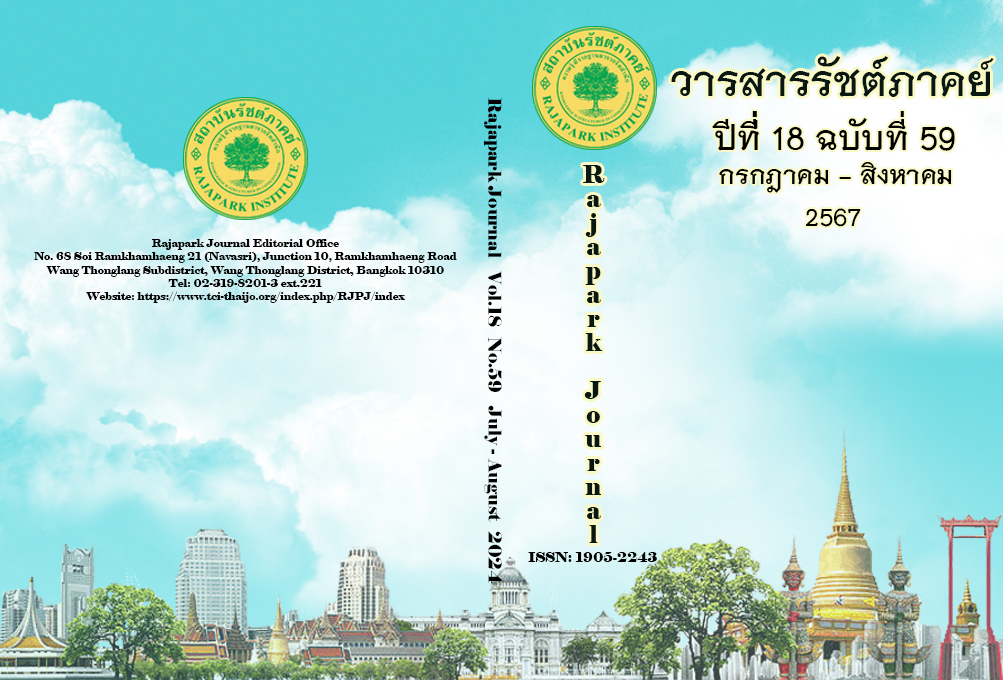The Design and Development of Constructivism Learning Environment Model to Enhance Scientific Thinking for Mathayom 1 Students
Main Article Content
Abstract
At present, Thailand is facing problems in the development of science teaching because of
the teaching style that emphasizes teaching in the classroom. There is a lack of encouragement for students to take action and search for knowledge by themselves. The researcher therefore conducted this research with the objectives of 1) developing a constructivist learning environment model to enhance scientific thinking 2) studying scientific thinking 3) studying academic achievement 4) studying the relationship between scientific thinking and academic achievement, and 5) studying the opinions of students. Use a model research format that has 3 phases: Phase 1, model development, Phase 2, model validation, and Phase 3, model use. The population and sample consisted of 12 experts, 40 Mathayomsuksa 1 students at Srikranuan Witthayakhom School, and 39 people at Nam Phong Suksa School. The research results found that 1) the constructivist learning environment model consists of (1) a problem-based approach, (2) resources, (3) collaboration, (4) a science vocabulary bank, (5) a scientific thinking center, (6) related cases, (7) scaffolding, and (8) coaching. 2) The scientific thinking of students in Phase 2, averaged 16.54 points, 82.69 percent, S.D. = 1.16; Phase 3 averaged 16.72 points, 83.65 percent, S.D. = 1.03. 3) The academic achievement of the students found that in Phase 2 and Phase 3, the scores passed the 70% criteria set forth. 4) The relationship between scientific thinking and the academic achievement of the students in Phase 2. The correlation coefficient (r) = 0.719, Phase 3 (r) = 0.706 at the significance level of 0.05, and 5) student opinions found that content, media, and design were consistent with theoretical principles and promoted learning knowledge creation and scientific thinking of students.
Article Details

This work is licensed under a Creative Commons Attribution-NonCommercial-NoDerivatives 4.0 International License.
Views and opinions appearing in the Journal it is the responsibility of the author of the article, and does not constitute the view and responsibility of the editorial team.
References
Aksorn Education. (2024). Science subject One of the important subjects that play a role in world society. https://www.aksorn.com/ac1-science-important-to-the-global-society
Chaijaroen, S. (2014). Instructional design: Principles and theories to practices. Anna offset.
Delaney, H. (2019, April 22). Education for the 21st Century. Placing skills development at the heart of education. https://www.unicef.org/thailand/stories/education-21st-century
Duongyai, W. (2022). The effects of constructivist theory through active learning on mathematical learning of education students majoring in Mathematics at Phranakhon Rajabhat University. Journal of Modern Learning Development, 7(7), 13-29.
https://so06.tci-thaijo.org/index.php/jomld/article/view/256303
Hendrich, S., Licklider, B., Thompson, K., Thompson, J., Haynes, C., & Wiersema, J. (2018). Development of scientific thinking facilitated by reflective self-assessment in a communication-intensive food science and human nutrition course. Journal of Food Science
Education, 17(1), 8-13. https://doi.org/10.1111/1541-4329.12127
Khumkongsuwan, K., Hajisalah, S., Janjaroon, A., & Watthanawisut, A. (2020). A study of Matthayomsuksa II students’ proof ability in parallel-lines topics via the Constructivist Learning Model (CLM). Journal of Industrial Education, 19(2), 50-59.
https://ph01.tci-thaijo.org/index.php/JIE/article/view/240523
Khum-un, S., & Jirachotdaecho, G. (2019). The effects of STAD-based constructivist learning approach on mathematics learning achievement. Journal of Education Studies, 47(Suppl. 2), 328-345. https://so02.tci-thaijo.org/index.php/EDUCU/article/view/232630
Kumpang, P. (2021). The development of constructivist learning environment model cooperate simulation to enhance problem solving for veterinary students[Doctoral dissertation, Khon Kaen University].
Kwangmuang, P. (2018). The result of learner’s critical thinking development used with constructivist learning innovation to enhance knowledge construction and critical thinking for undergraduate student. Panyapiwat Journal, 10(1), 175-184.
Kuhn, D. (2010). What is scientific thinking and how does it develop?. The Wiley‐Blackwell handbook of childhood cognitive development, 497-523.
Kuhn, D., & Udell, W. (2003). The development of argument skills. Child Development, 74(5), 1245-1260.
Lavananggoon, J., Chindanuruk, T., Chaowakeratipong, N., & Fakkao, S. (2019). Development of a science instructional process based on the constructivist theory to enhance learning achievement and higher order thinking ability of mathayom suksa II students. Journal of
Graduate Studies Valaya Alongkron Rajabhat University, 13(1), 11-22. https://so02.tci- thaijo.org/index.php/JournalGradVRU/article/view/186604
Office of the Education Council. (2022). PISA 2022 assessment results. PISA THAILAND. https://pisathailand.ipst.ac.th/news-21/
Panakaseng, W., & Pakapongpun, A., & Dokchan, R. (2018). Mathematical learning activities based on constructivist theory on linear programming using the geometer’s sketchpad program for mathayomsuksa 5 students. Journal of Education and Innovation, 21(1),
-219. https://so06.tci-thaijo.org/index.php/edujournal_nu/article/view/70362
Patchsuriya, P., & Boonprakarn, K., & Kotcharat, J. (2020). Situations and problems in learning science subjects of grade 7 students under the secondary education office region 16 Songkhla. In The 11th Hatyai National and International Conference. 508-519.
Pedaste, M. et al. (2015). Phases of inquiry-based learning: Definitions and the inquiry cycle. Educational Research Review, 14, 47-61. https://doi.org/10.1016/j.edurev.2015.02.003
Pikunkwan, P., & Inoue, N., & Ketsing, J. (2023). The study of junior elementary school students’ level of non-cognitive skills and causal relationship model of factors influencing the children’s science learning achievement. STOU Education Journal, 16(1), 17-32.
https://so05.tci-thaijo.org/index.php/edjour_stou/article/view/257830
Richey, R. C., & Klein, J. (2007). Design and developmental research. Lawrence.
Saridpaisan, N., & Chaiprasert, P., & Thongsorn, P. (2019). The effects of learning management using scientific methods with higher-order question to promote learning achievement, integrated science process skills, and analytical thinking ability of 7 grade students.
Journal of Education and Innovation, 21(3), 113-126. https://so06.tci-thaijo.org/index.php/edujournal_nu/article/view/88435
Singha, P. (2018). The development of constructivist web-based learning environment model to enhance problem solving: Integration between pedagogy and neuroscience[Doctoral dissertation, Khon Kaen University].
Siripatharachai, P. (2015). Causal factors influencing grade 6 students’ science achievement in Wattana Distric, Bangkok. Srinakharinwirot Research and Development Journal of Humanities and Social Sciences, 5(10), 80-91.
https://so04.tci-thaijo.org/index.php/swurd/article/view/32221
Thammabut, T. (2021). The development of constructivist web-based learning environment model with simulation to enhance Ill-structured problem solving for engineering students[Doctoral dissertation, Khon Kaen University].


